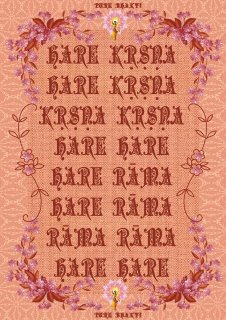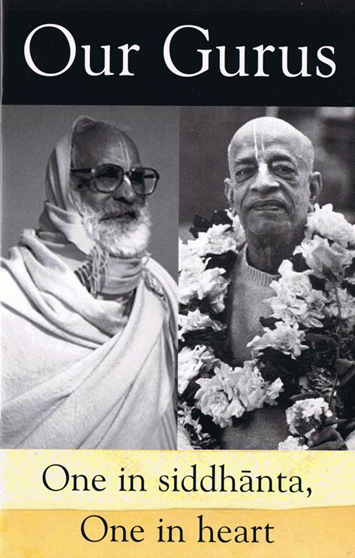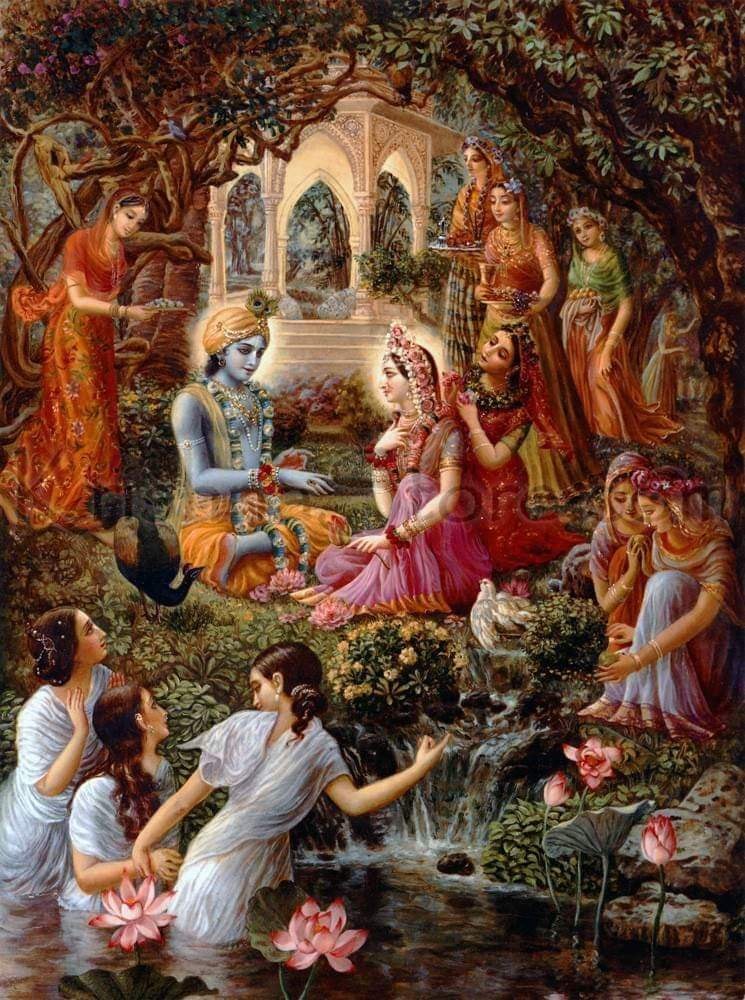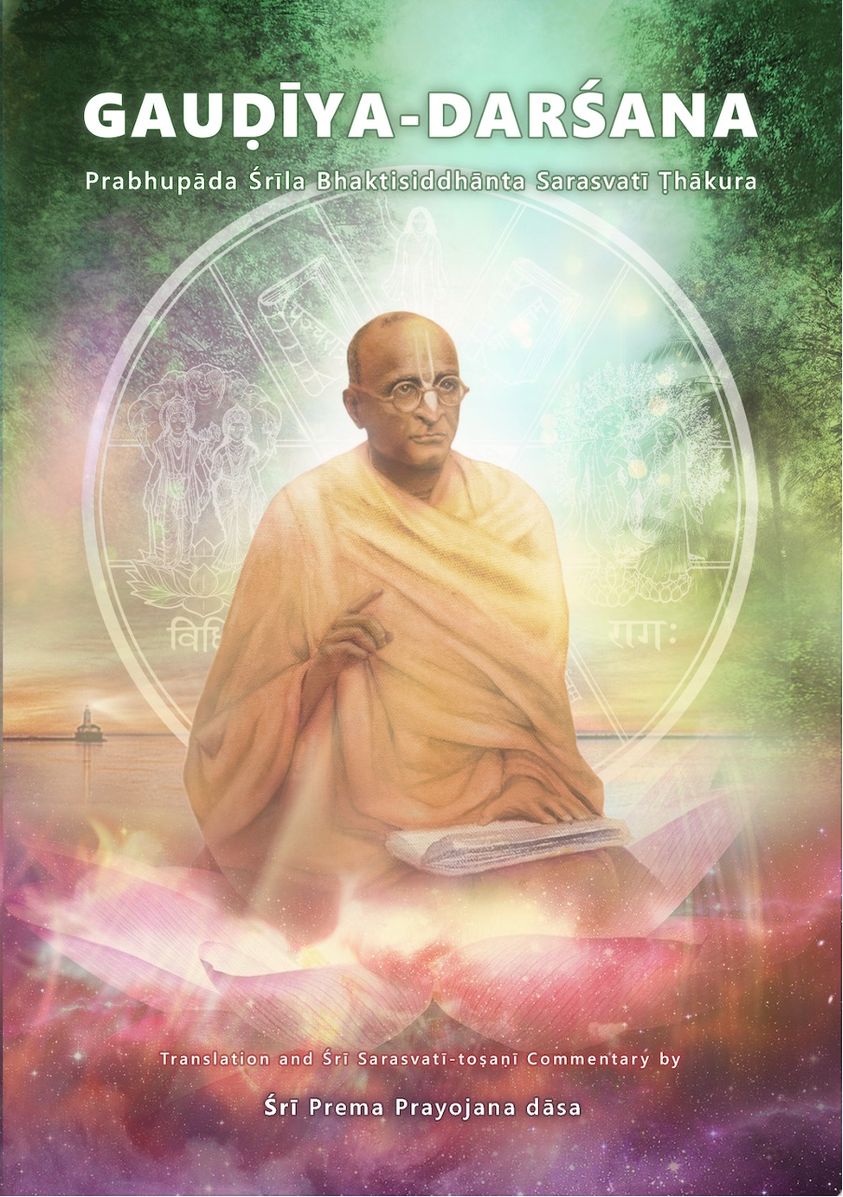By Narasingha das
The original article appeared in www.backtobhakti.com , Devarsi
Find a "delicious peanut butter recipe" at the end of this article
I pray to Srila Gurudeva for his blessings that I may always remember, with ever-growing gratitude and affection, his lotus feet and his words, all steeped in the love overflowing from his divine heart. He is my very best friend and well-wisher, and I pray to all the Vaisnavas that I might one day be fit to serve him in a pleasing manner.
I was in a conversation with a friend recently regarding spiritual topics. As a student in the Gaudiya Vaisnava school of Bhakti-Vedanta, I naturally referred to some Sanskrit terms and phrases with the intention of clarifying and also validating some of the points I was making. But my friend Chip became frustrated with such words that, as he put it, meant nothing to him, were simply alien sounds. He was similarly unimpressed that what I was saying had been said by someone I accepted as a saint or guru that he did not know. So I considered how I might rephrase what little I have been able to understand of my Gurudeva’s words in a language that seemed authentic for me, and could appeal to Chip’s sense of reason.
This reminded me of my erstwhile residency at one well-known spiritual community where it was decided to ‘translate’ everything as much as possible into the language and culture of the country we were in, namely America. Virtually all of our songs and prayers had been rendered into English, our dress had been adapted into a curious saffron version of a combination of a Christian monk’s habit and a pixie’s cloak … and it was eventually recognized that something very dear and sacred had certainly been lost in translation somewhere.
Interestingly enough, at one of the Interfaith Festivals that we hosted there, a visiting American Buddhist monk confided in me. I was at that time the festival cook for all the guests, and so most of the guests naturally regarded me as a friend. Indeed, this monk and I spent a fair time together. Indeed the evening before he left he finally allowed me to cajole him into chanting the maha-mantra (which at least had not been converted along with everything else), though he would not dance, as that would have been too great a contradiction to his own vows and practices.
After the kirtan, he pulled me aside to tell me that actually he had been sent to visit our community during this Interfaith Festival so he could observe this whole process of Interfaith inclusivity, where we were letting go of seemingly external cultural forms for the sake of broadening our appeal beyond the exclusivity of apparently sectarian dogmas.
His superiors had sent him to make a determination as to whether and how their own temple should follow our lead; and he had pulled me aside to share what he was going to tell his abbot. And this what he said. “Don’t do it! Don’t even consider it. These Hare Krsnas have lost their own identity, they are neither one thing nor another now; and in the process it seems to they have lost so much of their joy also.” I was deeply impressed by his perception – I had personally been feeling so much emptiness and sadness, but I had considered that my own experience was not the real point, it was a sacrifice for the sake of preaching. Enough to say here that his words prompted me to reflect more objectively on what was going on, so that I then had a private meeting with the head of that community, in which he shared with me his understanding regarding kirtan. Following this, I took a week to relocate my family and myself, and never lived at that community again.
So by the time I had this conversation with Chip, I had become clear that there is something very deep and precious in the language that our teachings and practices are expressed in, that transcends any mere arbitrary cultural or sectarian quirk of language. But how was I to convey something of this understanding to him?
“What is this thing called love?”
Srila Gurudev has pointed out that in Sanskrit, there are something like 96 words for love. And there is practically not a word in the English language that accurately refers to any of these! Consider how we use this word ‘love’ – we may ‘love’ a favorite place or article of clothing or foodstuff or music or any other object. This is actually the key word here: ‘object.’ We are so used to regarding everything and everyone as objects for (or against) our own enjoyment, where we ourselves are the subject. And so we label everything and everyone according to the nature of our senses, to our likes and dislikes, as good or bad, friend or enemy. Therefore we can ‘love’ someone one day, and then completely reject them the next, without any concern for their well-being; and we can ‘love’ some food, without any consideration at all for the unspeakable suffering that may have been generated for such an item to appear on our plate. We objectify animals, ‘inferior’ nationalities, women, the environment … everything.
![6671698_1301807015_68[1]](http://www.harekrishnasociety.com/wp-content/uploads/2012/04/6671698_1301807015_681.png)
Of course, this same word ‘love’ can also refer to an emotion that can so open a person’s heart that they are willing to give up their very life for it, as a man will for his country, or a mother for her child. So this clearly illustrates the problems with our language, the confusions arising from such paucity of distinct words. Helen Keller, who became blind, deaf and mute due to an illness at the age of 19 months, described later that in all the years devoid of words or formed thoughts, she didn’t actually know she existed, she had no language to identify herself and her experiences. There was no pain because there was no ‘Helen’ to feel any pain, only a body with sensations. She existed as a sort of nothingness.
Language facilitates our cognition and awareness. So that the more distinctions in our language, the clearer can our understandings be. Hence there are so very many words for love in Sanskrit, the language intended to open the mind and elevate the consciousness to the highest understandings about love, and about all the many stages and flavors of this.
But meanwhile the language we are actually used to converse in is English (or something of a similar quality). And Chip was not particularly interested to learn Sanskrit, or to accept anything simply because someone had written it in Sanskrit so many years ago. Not that I am familiar with more than the lightest dusting of this celestial language myself anyway! So then we considered together that although our words may lack clear distinction, we are able to invest them with emotions that make the meaning s much more apparent, and then we further support such meanings by our actions – or not, as the case may be!
The word we were especially considering was ‘love’ – and we considered how people do indeed seem to lend themselves so completely to this word, and to the emotion it implies. And yet, it is still not complete. The love the mother feels for her own child – she does not feel for all the other children, regardless of nationality or race or even species, so that she may willingly support a system that kills the children of another to feed her own, or to advance their economic status, Similarly the love the patriot feels for his own country, he does not feel for those his country may be at war with. And the love the lover feels so strongly for his beloved is also exclusive … and usually colored by selfishness, whereby in the name of his love, he is unwilling to let his beloved go should she be unwilling to stay with him. Indeed, sometimes such intense ‘love’ becomes so distorted as to invoke murder and suicide.
Still, even such conditional love evokes our deepest longings. We know, in our hearts, that ultimately this life is meant for love, that without love, all is for naught. As it is said, ‘tis better to have loved and lost than to have never loved at all.’ The highest truth, the greatest meaning, the real purpose of our lives, all point to love; for it is love that connects and binds all together. The people we honor above all others in society are those who have loved others the most, who have been wiling to sacrifice themselves because of their love for others.
At which point in our discussion, Chip happily concurred. “Yes, that is the meaning of God. God is love, and love is God. And our purpose is to become one with this love, that there must be nothing between us and love: one love.”
Without love – without Radhika – He cannot exist for even a second” (Srila Gurudeva, Yoga for Peace)
So Chip and I discussed a little further – that God is love, must be love. And that He is the very form of love, the self of love – so that such love must in fact be a person. For where there is no person, no self and also no other, then where is the love? Love is that which exists between the lover and the beloved. Take away these two, and what could possibly be the meaning to love?
This Supreme Personality of Love has so very many names that indicate and describe so many specific and special qualities and characteristics and relationships. And of all these, the name Krsna is Supreme, for Krsna means all-attractive, that He is attracting the hearts and love of all beings, in every relationship; so that He is the very greatest friend, the dearest of all children, and the perfect and unlimitedly beautiful lover, fully captivating and enchanting the hearts and minds and souls of everyone, and filling them with sweetness that knows no bounds.
And still there is more. For not only is Krsna the very source of all love … but His love also has a Name and a Personality of Her own – so many names actually, just like Krsna also has. But especially she is known as Radha, or Hare. They are the supreme subject and object of each other’s love, two inseparable halves (as Srila Bhaktisiddhanta Saraswati described: ‘moieties’) of an indivisible whole. Simultaneously They are one and the same, and also distinct – inside of which tension They are eternally engaged in the most sublime loving pastimes of union and separation.
Such is the foundation, the heart, of all that is. Our own existence is intended, ultimately, but to celebrate and serve and enhance such love. We are not the subject, with everything else to be regarded as potential objects for our own pleasure, as we imagine in this worldly life. Rather, we are ourselves meant for His enjoyment, to serve under the direction of His own love, without whom He cannot even exist.
Chip then began to reflect on this much abbreviated and simplified understanding of the nature of the Absolute Truth, in respect both of his own potential for understanding, as well as of the fact of my own very tiny and distant actual appreciation of such a transcendental subject. I pointed out that actually, all such was merely philosophical and intellectual, and insufficient to engage our own experience of such love. Yet there is also a language of love, that perfectly expresses and embodies this divine love, and offers us entrance to its own abode.
It is not but a language of convention and symbol, where the word is distinct from whatever it may refer to. It is not a language of concepts, of imagining that our mental grasp actually gives us a true knowledge or experience regarding the object of our thoughts. No, it is nothing mundane, nothing from this relative plane. Rather it is the original language of love, descending from the Absolute plane, where the word and that which it refers to are simultaneously one and separate.
Krsna’s name and words are of the same quality as Himself, for they are indeed a part of Him. If He was without names and words, then such could not exist at all, not even in anyone’s imagination, for the very meaning of God is the origin of all that is. If something is not within Him, then it simply is not – there is no existence outside of His own.
Therefore His own names and words exist also for His pleasure, to celebrate and enhance His love. And as there are unlimited varieties and expressions and flavors of His love, so there are also so many nuances of linguistic expression of the same, that are known to Him and to those who intimately engage in His own loving pastimes in that transcendental domain. Such personalities then come to this world out of their unbridled compassion and act as conduits for these very transcendental expressions and the emotions they embody, giving us a connection with what is otherwise entirely beyond our comprehension, our anticipation, our experience.
A guru should have realization of God so that he can give God from his heart to others’ hearts” (Srila Gurudeva, Yoga for Peace)
The words of such pure devotees, the embodiments of their own transcendental ecstasies and absorptions, are our scriptures, our meditations, our paths. They reveal to us the language of love by which we may find our way back to the very abode of love. And they have taught us that of all such divine words, none are so sublime as the very names of the Supreme Lover and Beloved Themselves, for these are the source of everything, and nondifferent from Themselves and Their love in the eternal dance of Their union and separation. So as students and followers of the realized souls who have descended from the spiritual plane and their own engagement in the loving pastimes of Radha and Krsna there, we are also seeking to immerse ourselves in chanting the kirtan of the holy names. Not for our own sense of pleasure or vanity or distinction – or as Gurudeva cautions, not looking to see who is listening and admiring our singing – but simply to serve these most beautiful names, by giving all our attention, all our love, all our everything, without conditions or restraints.
Of course, Chip is not here, nor is he reading these pages. So I can close this narrative with some words of both encouragement and also caution, that are verbatim from the lotus mouths of several of our most beloved preceptors, and that can thus bring us the greatest possible benefit and inner gratification. And I especially thank our dear kirtaniya Sriman Kisori Mohan prabhu for bringing so many such inspiring statements to our attention via his Facebook page.
“As long as we do not join the perfect Krsna-kirtana conducted by genuine devotees, maya will delude us in various ways. And if we join the kirtana of the blinded self-deceivers who are not anxious for their true well-being then surely we will not attain our own true well-being. If we follow people who never receive instructions from the true Vaisnavas but just imitate them by decorating their bodies with tulasi beads and other marks, and who shout out what appears to be names of God in external sound alone, we will not find sri hari-nama-sankirtana.” Srila Bhaktisiddhanta Sarasvati Thakura Prabhupada
“If it is to be effective, the sound of the holy name of Krsna must have a divine quality. The holy name of Krsna, which is infinite, can do away with everything undesirable within us; but the name must be invested with a real spiritual conception. It must not be a mere physical imitation produced only by the help of the lip and tongue. That sound is not the holy name.” Srila Bhakti Rakshaka Sridhara Goswami Maharaja.
“All of our duties should be performed while singing nama -sankirtana. Suppose there is a pitcher of water. If we simply add some lemon juice and some sugar, it immediately becomes nectar. Similarly, we must perform so many worldly duties, but if, following in the bhava of our spiritual master, we meditate on Bhagavan while carrying them out, they will all become nectar. In the conditioned state, we are always considering what is favourable and what is unfavourable to our bhakti. Because we are in the beginning stages, everything appears to be unfavourable to us, and therefore our minds are disturbed. But to the degree whichwe progress in sadhana-bhajana means to that degree the vision of what is unfavourable will diminish. And when one reaches the stage of bhava, he will perceive everything that he previously considered to be unfavourable as favourable. Actually, nothing in this world is unfavourable to us; it is only due to our present weaknesses and anarthas that we see our environment as unfavourable. Whatever obstacles we are currently facing are due to our own previous misdeeds, and are not the fault of any other person.” Bhakti -rasayana by Srila Bhaktivedanta Narayana Maharaja.
“The Vedas are giving hints about the Holy Name of Krishna. The Vedas naturally tell us that we can approach the supreme reality only through sound. Otherwise they would be suicidal. If they do not say that by sound only we will attain the truth, then what is the necessity of the Vedas, which are only embodied sounds? So, if we can trace their real characteristic, we shall find that the principal Vedas say that by the cultivation of sound we can attain the Lord. Absolute sound alone can deliver reality.
“… The branches of the Vedas are all sounds, and so many sounds must come from a central position. They cannot but direct one who has a proper eye towards that fountainhead of sound, saying “Go! Run towards that direction! In our source you will find everything. We are all partially representing so many things, but we have a centre, we have a fountainhead, Go in that direction and you will find the sound that can sufficiently satisfy you, and you may also be introduced to other aspects of that sound.

The Holy Names
“… If anyone comes in connection with the Name. He will get the benefit. The nature of Krishna’s Name is such: autocratic and boundless mercy. The transaction may go on in any place any time. Where all have faile, Krishna’s Name has His glorious wave. No adverse circumstance can produce any obstacle to this.
“The only condition is that to have the real thing we must have a proper connection. It must be the Name of Krishna and not an imitation. So it is said that the physical sound may appear, an imitation, but it is not effective, because that is not Krishna.
“Our attainment of the goal is not assured simply by increasing the number of times we repeat the Name: only by increasing the quality will we reach success. There are so many saying in the scriptures to encourage our realization of the Holy Name in different ways, but Sri Rupa has given us a central thought. He quotes the Padma Purana: ‘Our senses, physical or mental, are ineligible to come in touch with the transcendental,’ The Name is non-material, without mundane limitation. It belongs to another plane.
“So, nothing about Krishna – His name, form, qualities or pastimes-can be touched by our physical or mental senses, but when we have a serving attitude He comes down to us of His own accord. Only then can our tongue really pronounce the Name of Krishna, otherwise only the physical sound of the letters of the Name can be produced.
“Our tongue, our hands, physical sound, all these mundane things cannot come in touch with Krishna. Some intervening medium is necessary to connect this body with the supra-mundane, and that connection is our earnest desire to serve Krishna to satisfy Him.
“A bulb won’t light if there is no electricity. Only when the electrical current is there will the bulb be illuminated. So, the Name may appear on the tongue and in the ear, in the mind or in writing, but we must have the connection from the transcendental realm to this mundane world, and that connection is devotional service, a functional serving attitude. That alone can connect the physical realm with the unlimited spiritual world.
“Krishna will appear of His own accord. He will descend upon your tongue and then your tongue will be able to chant the Name of Krishna. A gun that has not bullet, but only a blank, may make some sound, but no bullet is actually fired. Similarly, chanting the Name of Krishna without an attitude of service produces sound, but that is only tongue deep. It is like firing a gun with blanks instead of bullets.
“Our chanting of the Holy Name of Krishna must be surcharged with a serving temperament, the tendency to satisfy Krishna. Otherwise the sound we produce is bogus. It is only an imitation, or permutation. The Holy Name cannot be experienced by our senses. It is supra mental and transcendental. An ordinary sound of this mundane world cannot be the Name of Krishna. Our ear cannot even hear the Name if that mediator, the serving attitude, is not there. The earnestness to satisfy Krishna’s will mediate between Krishna and the ear, through the mind. Then only will Krishna’s Name enter our ear and reveal to us His form, qualities and pastimes.
“The Holy Name is not physical, it is transcendental, supra-mundane. Only through our service attitude will it come down to this mundane world. Only through service can we directly come in contact with Krishna. The real point is to practice to attain the spirit of service. The devotee is doing service and we must imbibe from him the methods of attaining this serving attitude. Hare Krishna!” (from Primordial Sound, by Srila Bhakti Rakshak Sridhara Swami Maharaja)
![sridhar[1]](http://www.harekrishnasociety.com/wp-content/uploads/2012/04/sridhar1.jpg)
Srila Bhakti Raksak Sridhar Dev-Goswami Maharaj




 Posted in
Posted in  Tags:
Tags: 







